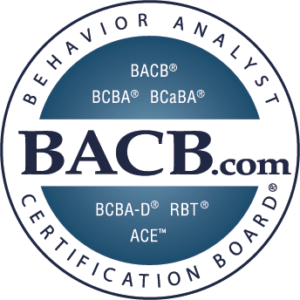

Behavior Technician Training
Registered Behavior Technician Training Course
Become a Registered Behavior Technician
 There are a growing number of opportunities for Registered Behavior Technicians (RBT®), including jobs in psychiatric care, behavioral disorders, mental health, and education. This 100% online registered behavior technician certification course is designed to provide you with comprehensive knowledge to gain the essential skills you need to meet the 40-hour training component and begin a career as a registered behavior technician.
There are a growing number of opportunities for Registered Behavior Technicians (RBT®), including jobs in psychiatric care, behavioral disorders, mental health, and education. This 100% online registered behavior technician certification course is designed to provide you with comprehensive knowledge to gain the essential skills you need to meet the 40-hour training component and begin a career as a registered behavior technician.
During the 40-hour registered behavior technician training course, you have access to a Board-Certified Behavior Analyst (BCBA®) who will provide feedback on in-course assignments designed to specifically prepare you for the Initial Competency Assessment.
Job Outlook for Registered Behavior Technicians
According to Salary.com, the average Registered Behavior Technician salary in the United States is $52,464 per year. The U.S. Bureau of Labor Statistics (BLS) predicts a 9% growth in jobs through 2031 for psychiatric technicians and aides. This equates to 12,500 newly created jobs.
In addition to new jobs from growth, the BLS also reports that opportunities will also arise from the need to replace workers who get promoted or retire. Around 16,500 job openings each year, on average, are projected to come from replacement needs over the next eight years.
Registration and Enrollment
This course is 100% online. Start anytime.
Program Contact
Dillard University
2601 Gentilly Boulevard
New Orleans, LA 70122
Ph. (504) 283 – 8822
admissions@dillard.edu
Office Hours:
M-F 8 a.m. – 5 p.m.
Registered Behavior Technician FAQs
There are many opportunities for Registered Behavior Technicians, including jobs as a psychiatric technician or aid, jobs working in behavioral disorders and mental health, and jobs in education.
Do I Need to Be Certified as a Registered Behavior Technician?
Yes. In order to become a Registered Behavior Technician, you will need to get certified. This course meets the 40-hour training requirement of the Behavior Analyst Certification Board's (BACB) Registered Behavior Technician (RBT) certification process. It also includes a voucher for the BCBA certification exam but does not include the application fee. The voucher is prepaid access to sit for the certifying exam upon eligibility.
How Long Does It Take to Complete a Registered Behavior Technician Training Course?
Our RBT Training course is 100% online and entirely self-paced. With our open enrollment, you are able to start your coursework as soon as you are ready. You will be able to complete the course in three months or less.
Start your academic journey online at Dillard University, Louisiana’s oldest HBCU. Pave your way to success!
Course Objectives
- Summarize the role and the responsibilities of a Registered Behavior Technician (RBT)
- Measure operationally defined behaviors through data collection and graphical representation
- Determine a learner’s current motivations and reinforcers
- Understand appropriate behavior analytic interventions based on observations and documentation
- Obtain ethical behavior that upholds the rights and dignity of learners
Course Objectives
- Summarize the role and the responsibilities of a Registered Behavior Technician (RBT)
- Measure operationally defined behaviors through data collection and graphical representation
- Determine a learner’s current motivations and reinforcers
- Understand appropriate behavior analytic interventions based on observations and documentation
- Obtain ethical behavior that upholds the rights and dignity of learners
Prerequisites and Requirements
There are no prerequisites to take this online RBT course. To participate in the competency activities and receive feedback from your instructor, you will need to have access to a video camera (on the phone or other device of familiarity) and be able to upload the video as an .mp4 file to the assignment pages for review. These activities are required in order to successfully pass the course.
Instructors
Hannah Kruman
Hannah Kruman has worked as a Registered Behavior Technician (RBT) for several years within clinical settings, schools, and homes, before becoming a Board-Certified Behavior Analyst (BCBA). In her career, she has trained and supervised many behavioral technicians on various caseloads and assignments.
After transitioning to the Birth-to-Three/Early Intervention course, she became a service coordinator on top of her responsibilities as a behavior analyst, including completing intake assessments to determine eligibility for birth-to-three services.
Recently, Hannah established Horizon Behavioral Therapy and Education, LLC, where she provides behavior analytic services, parent training, and consultation. In addition to her BCBA, she is a Licensed Behavior Analyst (LBA), has completed her Initial Competency Assessment training, and holds a Master of Education (M.Ed.).
Rachel L White
Rachel L White, Ph.D., BCBA-D, has participated in federally funded grants implementing School-wide Positive Behavioral Interventions and Supports (SWPBIS) in public schools and training parents of children with autism using online and video-conferencing technologies. She has coordinated both center-based and in-home programs. She has also supported a private school, a preschool, and school-based services and provided parent, caregiver, and community educational opportunities.

